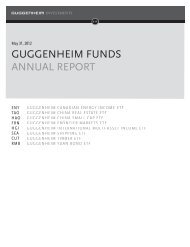Guggenheim Credit Allocation Fund GGM - Guggenheim Investments
Guggenheim Credit Allocation Fund GGM - Guggenheim Investments
Guggenheim Credit Allocation Fund GGM - Guggenheim Investments
- No tags were found...
You also want an ePaper? Increase the reach of your titles
YUMPU automatically turns print PDFs into web optimized ePapers that Google loves.
The <strong>Fund</strong>’s investmentsgeneral characteristics similar to both debt and equity securities. A convertible security generally entitles the holder toreceive interest or preferred dividends paid or accrued until the convertible security matures or is redeemed, convertedor exchanged. Before conversion, convertible securities have characteristics similar to non-convertible debtobligations. Convertible securities rank senior to common stock in a corporation’s capital structure and, therefore,generally entail less risk than the corporation’s common stock, although the extent to which such risk is reduceddepends in large measure upon the degree to which the convertible security sells above its value as a debt obligation.A convertible security may be subject to redemption at the option of the issuer at a predetermined price. If aconvertible security held by the <strong>Fund</strong> is called for redemption, the <strong>Fund</strong> would be required to permit the issuer toredeem the security and convert it to underlying common stock, or would sell the convertible security to a third party,which may have an adverse effect on the <strong>Fund</strong>’s ability to achieve its investment objective. The price of a convertiblesecurity often reflects variations in the price of the underlying common stock in a way that non-convertible debt maynot. The value of a convertible security is a function of (i) its yield in comparison to the yields of other securities ofcomparable maturity and quality that do not have a conversion privilege and (ii) its worth if converted into theunderlying common stock.Mortgage-backed securitiesMBS are structured debt obligations collateralized by pools of commercial or residential mortgages. Pools ofmortgage loans and mortgage-backed loans such as mezzanine loans are assembled as securities for sale to investorsby various governmental, government-related and private organizations. MBS consist of complex instruments such ascollateralized mortgage obligations (“CMOs”), stripped MBS, mortgage pass-through securities, interests in realestate mortgage investment conduits (“REMICs”), real estate investment trusts (“REITs”) that invest the majority oftheir assets in real property mortgages and which generally derive income primarily from interest payments thereon,and other securities that provide exposure to mortgages.MBS in which the <strong>Fund</strong> may invest may have fixed, floating or variable interest rates, interest rates that change basedon multiples of changes in a specified index of interest rates or interest rates that change inversely to changes ininterest rates, or may not bear interest. The <strong>Fund</strong> may invest in RMBS and CMBS, issued by governmental entitiesand private issuers. The <strong>Fund</strong> may invest in subordinated MBS and residual interest in MBS. The <strong>Fund</strong> may invest insub-prime mortgages or MBS that are backed by sub-prime mortgages. Additional information regarding types ofMBS that the <strong>Fund</strong> may invest in are described below.RMBS. RMBS are securities the payments on which depend (except for rights or other assets designed to assure theservicing or timely distribution of proceeds to holders of such securities) primarily on the cash flow from residentialmortgage loans made to borrowers that are secured (on a first priority basis or second priority basis, subject topermitted liens, easements and other encumbrances) by residential real estate (one- to four-family properties), theproceeds of which are used to purchase real estate and purchase or construct dwellings thereon (or to refinanceindebtedness previously so used). Residential mortgage loans are obligations of the borrowers thereunder only and arenot typically insured or guaranteed by any other person or entity. The ability of a borrower to repay a loan secured byresidential property is dependent upon the income or assets of the borrower. A number of factors, including a generaleconomic downturn, acts of God, terrorism, social unrest and civil disturbances, may impair a borrower’s ability torepay its loans.Government agency securities. The principal U.S. Governmental guarantor of MBS is the Government NationalMortgage Association (“GNMA”), which is a wholly owned U.S. Government corporation. GNMA is authorized toguarantee, with the full faith and credit of the U.S. Government, the timely payment of principal and interest onsecurities issued by institutions approved by GNMA (such as savings and loan institutions, commercial banks andmortgage bankers) and backed by pools of mortgages insured by the Federal Housing Administration (the “FHA”), orguaranteed by the Department of Veterans Affairs (the “VA”). MBS issued by GNMA include GNMA Mortgage Pass-Through Certificates (also known as “Ginnie Maes”).Government-related securities. Government-related guarantors (i.e., not backed by the full faith and credit of the U.S.Government) include the Federal National Mortgage Association (“FNMA”) and the Federal Home Loan Mortgage35



